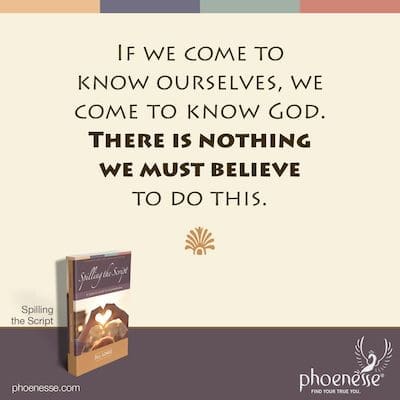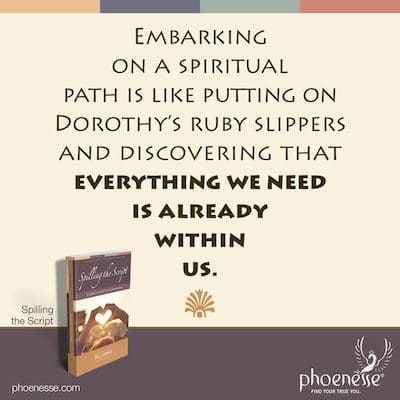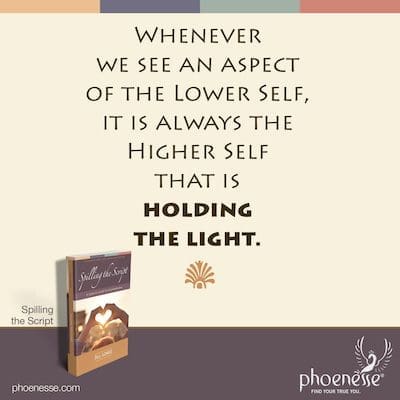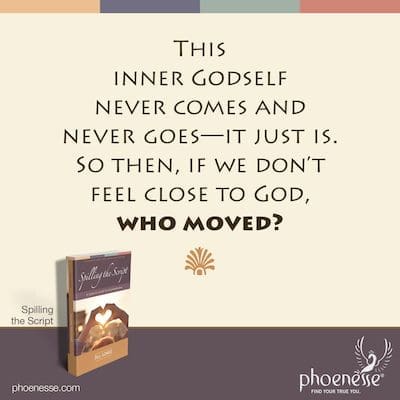Every human is a divine being at their center. Words tend to fail us in trying to describe this Godself inside us. Expressions that mean the same thing include: the light, the Oneness, universal consciousness, divine spark, core essence, higher power, Holy Ghost, and Christ consciousness, to name a few. The main catchall phrase used in these teachings is Higher Self. Whatever we call it, the truth is that everyone is, at their core, all good, and we’re all of God.

But often we look around and it doesn’t really seem that way. We encounter other people who are self-centered and unkind. Some days, we face conflict at every turn. Without a doubt, life on Earth with our fellow inhabitants can sometimes seem downright cruel. Say again, where exactly is God to be found in all of this? In fact, on this path of spiritual growth and healing, we learn that the light of God is often hidden behind layers of darkness. Some spiritual teachings call this the shadow; the Pathwork Guide calls it our Lower Self.
So while our light may shine through in certain areas of our lives, it is covered over in others. Our work then is to uncover whatever is blocking us from living from our Higher Self in any and all areas of our lives. When we do this, we will uncover our already-existing connection with all that is; we will experience the peace that surpasses all understanding; we will know that all is well.

On a spiritual journey, there is a shift from believing God is outside oneself, to realizing God is within. For some, this journey may involve pulling away from organized religion—where one goes to a special place, such as a church, to connect with God. Others may end up hanging out in an atheistic or agnostic place of believing there must be no God, or simply not knowing what to believe.
But because this longing to know God is really coming from within, it never completely goes away. Whether we know it or not, every single being on this planet is seeking to know God.
This journey of self-finding is not in opposition to any faith or religion.
The teachings from the Guide are all leading us to discover this truth of the divine within and to live fully from this inner core, or real self. To do that, we must discover who we truly are, and that takes a bit of work.
This journey of self-finding is not in opposition to any faith or religion. If we are getting nourishment and fulfillment in any of the world’s faith traditions, the Guide encourages that we continue—even as we may open to new thoughts from these teachings.
All well-known faiths and religions have something of value to offer. And all also have distortions. We are humans—it cannot be otherwise. It has been the same with the Pathwork community created around these teachings from the Guide.
In the end, this work of self-discovery boils down to coming to know ourselves. Because if we do that, we come to know God. There is nothing we must believe to do this. Along the way we will grapple with doubt, without which we would indeed be gullible. But on this path, we need to become willing to doubt even our doubts.
Learn more in Gems, Chapter 12: Four Pragmatic Steps for Finding Faith and Addressing Doubt.
If we could hear God’s words being spoken lovingly to each one of us, it would sound like this:
I am working through you.
I am in all your thoughts, if you wish to hear me.
And I am in all you see, if you wish to see me.
I am in all the words you speak, if you wish me to express through you.
I am in all your actions, if that be your commitment.
And as I manifest through you, you rediscover life in new terms.
You will see that life is a glorious oneness in which there is nothing to fear.
What need you fear if you discover me?
What need you fear if you identify with me?
Know that you are God.
As such you can never die.
Give that which is you now—
In your thinking, in your being, in your perceptions—
To me.
As you give yourself to me, so must you be eternal.
– Pathwork Lecture #236
This Higher Self of ours—this inner Godself—has never been negatively affected by anything that has happened. It is an aspect of our being that never comes and never goes—it just is. So then, if we don’t feel close to God, who moved?

The three major divine attributes of our Higher Self are wisdom, courage and love. This explains the enduring popularity of the movie, The Wizard of Oz, where brains, courage and heart are the tickets home. We each have one of these qualities as our primary essence, but all three are always present in each person, and when they are in balance they complement one another.
Our Higher Self is our conscience—that part of us that, deep down, knows we should be decent, love others, have faith and be kind. It is made of the finest, most radiant light and vibrates at the quickest frequency. The voice of the Higher Self is soft-spoken, so we must listen intently to hear its calling.
Higher-Self qualities include compassion, acceptance, humility, patience, understanding, honesty, authenticity, generosity, humor, perceptiveness and kindness. Our goal is to uncover and strengthen these attributes in ourselves.
So then embarking on a spiritual path such as this is like putting on Dorothy’s ruby slippers and discovering that everything we need is already within us and we can always find our way home—if we are willing to follow a path to self-knowing.
Many spiritual disciplines teach the truth that there is only one force in the universe, which is love. Love then is at the core of who we are. So when we have any negative emotions, we are not in alignment with the center of our own being. Pain is what arises from the tensions created by our own obstructions to our Higher Self, and from our struggle to avoid them. But friends, facing our Lower Self is exactly what we came here to do.
Earth is a plane of duality, so it holds both pleasure and pain, making it a match for the current condition of our soul: we are capable of pleasure but we’re also holding onto pain. To love in this realm, then—to access the core of ourselves—means we must become willing to feel both pleasure and pain: said another way, we must be willing to feel pain and keep our hearts open anyways.

So stepping into awareness of who we are—of living from our loving core—requires that we feel the pain we cause ourselves; this is the most important step to healing. Our ego needs to die many little deaths in coming to terms with our self-generated pain, until we realize that feeling this pain will not kill us. Then and only then will we be living in reality.
The Higher Self, by contrast, exists on the unitive plane of consciousness, so it can hold the opposites of duality but is not trapped in duality. So the Higher Self, we discover, sits comfortably with paradox.
When we are afraid to fully see ourselves, we stay in blindness.
This means that when we get trapped in the illusion of duality—when we see things as good versus bad, right versus wrong, white versus black—we are trapped by the Lower Self. We don’t want to look at this, so we focus our attention on someone or something outside ourselves and we project our wounds onto them; we see our dualistic splits “out there.”
What we need to start doing is turn around and look inward, to uncover the unfortunate misunderstandings and the immature demands of our Lower Self, along with our perpetual self-evasion. To do this, we need to get in touch with our own fear. Because when we are afraid to fully see ourselves, we stay in blindness.
We could describe the process of enlightenment as continuous, conscious surrender to this process of self-discovery and being in self-awareness. But let’s be clear, it is unrealistic to hope that we can reach enlightenment—to live our lives from the Oneness within—without going through the hard work of unearthing whatever is blocking our light.
Everyone has areas of blindness. We miss the whole point of living though when we hope to stay in the dark, believing we can avoid looking at ourselves forever. In doing this work of self-discovery, it helps immensely to have compassion and acceptance for the inevitable blind spots we discover in ourselves and others. And we need to remember that whenever we see an aspect of the Lower Self, it is always the Higher Self that is holding the light.
“Lord, help me to forgive those who sin differently than I do.”
– Crucial Conversations: Tools for Talking When Stakes are High, Kerry Patterson and Others
Learn more in Gems, Chapter 8: The Pain of Injustice and the Truth about Fairness.
It is a spiritual law that we cannot skip steps. If we do, we shall stumble and make this work harder than it already is. Plus, we will just have to back up and fill in the missing steps. It is also a spiritual law that there is always a price to pay, and we have to become willing to pay it. Spiritual bypassing refers to the desire to skip steps and not pay the price of doing this work.
This can happen when one wants to be more “evolved” than one really is, especially after having made some good initial progress. This is pride and it needs to be addressed. In its essence, humility is a Higher Self quality that we can develop by continually accepting and then purifying whatever negativity may arise in any moment.
A humble person is not concerned with how evolved others perceive him or her to be. What matters is finding one’s core and following the will of God. This is why this path is not about overlaying any beliefs, mantras, affirmations, altered states or positive thinking over buried faulty ideas. Because in the long run, such shortcuts do not work.
“What is to give light must endure burning.”
– Victor Frankl

Return to Spilling the Script Contents



